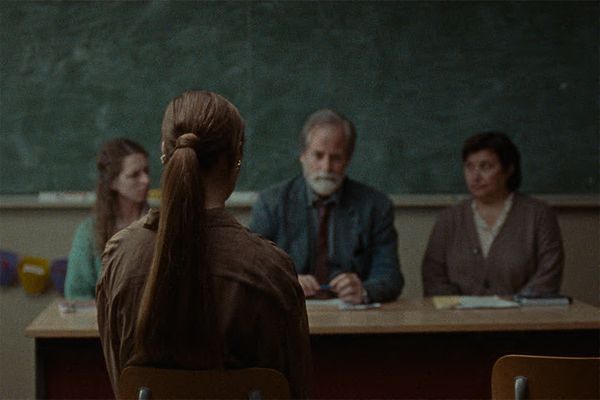Eye For Film >> Movies >> Armand (2024) Film Review
Armand
Reviewed by: Amber Wilkinson

Starting in physically high gear behind a car as it races along a narrow road, Armand’s sense of threat is immediate, further stoked, if anything, by the way that Renate Reinsve’s Elisabeth tightly tells someone on the phone: “No, I’m not stressed.” The score, too, from Ella van der Woude has an immediate nerve-jangling industrial quality.
This is a mark of what is to come in a tightly wound drama, which mixes chamber piece claustrophobia with something more psychologically experimental, as it is less concerned with scrutinising the playground than the dangerous games adults can play with one another. Elisabeth is heading towards the school where her young son is a pupil. A single mum, whose backstory unfolds gradually through the course of the film, she is also an established actress, something that adds a level of slipperiness to her interactions.

In the school, the tension is also palpable as the head (Øystein Røger) discusses how one of his younger teachers Sunna (Thea Lambrechts Vaulen) should approach the issue of an accusation that has been made about Elisabeth’s six-year-old son Armand by another boy, Jon. Although this unfolds in a school, the children are like phantoms, present only in the echoes of photos on the walls or the odd coat or winter onesie left hanging ghostlike on a peg. Interestingly, the film is, after Sundance’s Handling The Undead (which also stars Reinsve), the second notable festival entry this year to be set in the sweaty heat of a Scandinavian summer, rather than the cooler vibe more closely associated with recent cinema from the region.
Also arriving at the school for this discussion are Jon’s parents Sarah (Ellen Dorrit Petersen) and Anders (Endre Hellestveit), who turn out to have an existing relationship with Elisabeth and Jon that also adds to the film’s simmering sense of anxiety, which is nicely offfset in places with snatches of dark humour.
Writer/director Halfdan Ullmann Tøndel is the grandson of Liv Ullman and Ingmar Bergman but the director most evoked here is Roman Polanski, with the likes of Carnage. Tøndel goes big on mood, pushing things towards the edge of absurdity by throwing in a fritzy fire alarm and a random recurrent nosebleed for good measure as the battle lines are drawn. It fits the situation, however, given that as Elisabeth points out, what Armand is being accused of does seem questionable. A discomfiting sequence, which showcases just how adept Reinsve is at delivering, sees Elisabeth have a borderline hysterical laughing fit over, as she views it, the ridiculousness of the situation and further probes at ideas of performance in human communication which is as much about reaction as interaction.
The film’s more surreal element is also fed by choreographed sequences that happen in the school corridor, which are intended to reflect Elisabeth’s mental state. It’s an ambitious idea, although arguably this device would work better if it was introduced earlier than it is or used more frequently as Tøndel’s commitment to it feels shaky. His attachment to vibe over narrative also means additional plot arrives at a gallop towards the end, so that some of the more interesting elements raised by the tangled web of relationships that are revealed are left tantalisingly dangling rather than fully explored.
The winner of the Camera d’Or for Best First Feature in Cannes, Tøndel is to be congratulated for his ambition, subtle mood manipulation and his work with the actors, who deliver strongly as an ensemble, even if he still has a few lessons to learn about structure.
Reviewed on: 05 Jun 2024















